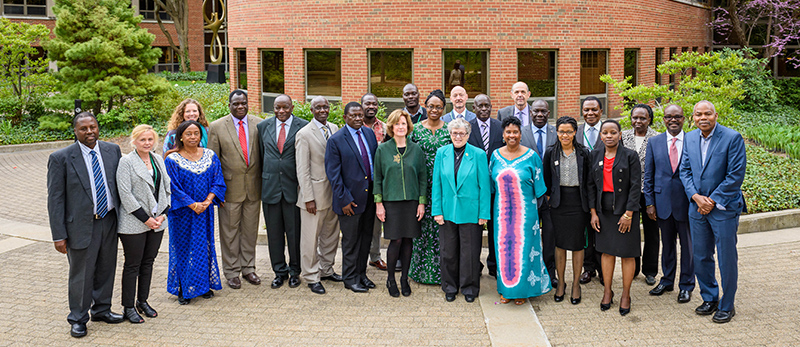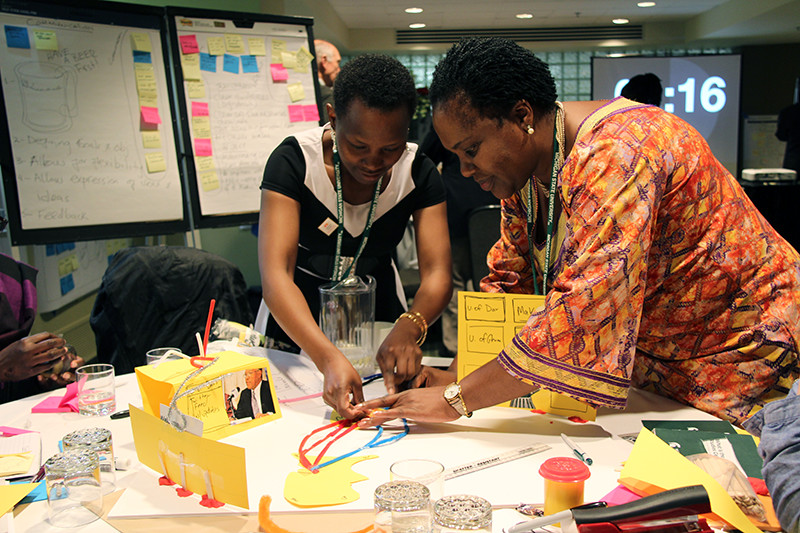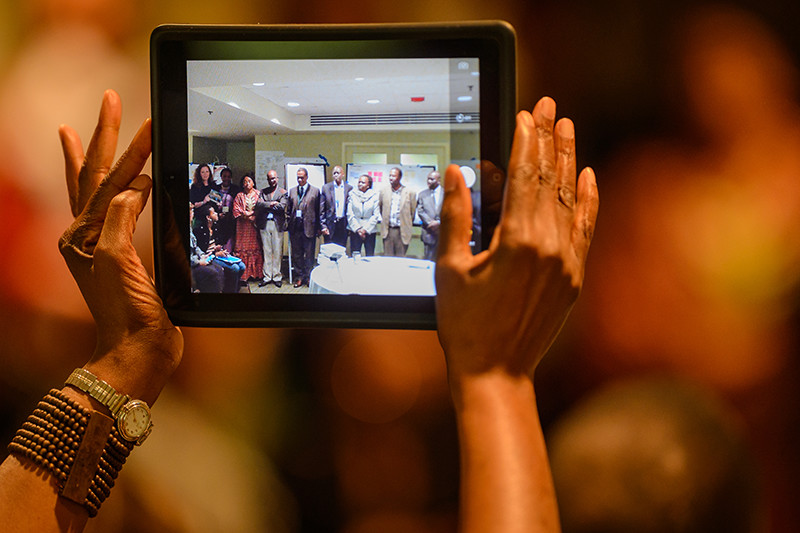Building on decades of engagement in Africa, Michigan State University has launched a bold new initiative—the Alliance for African Partnership (Alliance)—to develop a collaborative and cross-disciplinary platform for addressing challenges on the continent.
"The world is changing. Africa is changing. So we must evolve and improve the way we work with our African partners," said Steven Hanson, associate provost and dean of international Studies and Programs at MSU. "Through the Alliance for African Partnership, we seek to co-create a new model of mutually beneficial collaboration that will not only help us take on today's problems, but better prepare us for tomorrow's challenges as well."

MSU President Lou Anna K. Simon with AAP Convening attendees and staff.
Michigan State University has a rich history of engagement in Africa that traces back more than a half-century. Today, MSU has more than 60 active research and development projects with African partners, including work in food, agriculture, health, and education. MSU has the leading and largest faculty engaged in Africa-related research, offers more Africa-related courses, and conducts more development work in Africa than any other university in the United States.
However, Africa and its place in the world—and by extension the nature of the relationships between African organizations and universities—is rapidly shifting. Today, sub-Saharan Africa accounts for roughly 15 percent of the world’s population. This share will rise to 37 percent by 2100 as the region’s population is projected to quadruple to roughly 4 billion people. African affairs will increasingly affect other areas of the world—economically, politically, demographically, and culturally. Much of Africa is experiencing urbanization, impressive agricultural dynamism, rapidly changing food systems and diets, and shifts in the labor force into growing non-farm economies. A major premise of the Alliance is that collaborative research partnerships between African and MSU researchers can assist African governments, private firms and civil society groups to anticipate and respond proactively to these trends.
“Over the years, MSU has been successful in developing many meaningful and productive partnerships with African colleagues, and we have tremendous opportunity to expand on that foundation,” said Thom Jayne, co-director of the Alliance for African Partnership and MSU University Foundation Professor. “MSU’s land-grant values provide us with a solid framework as we adapt to these changes that are happening in the region.
The first step to launching the Alliance was to bring a group of African and MSU leaders together to begin a co-creation process to develop the initiative. Over three days in May, 14 distinguished African guests joined MSU faculty, staff, and students in East Lansing for a unique design workshop aimed at developing new forms of collaboration. The diverse group of invited African participants included government officials, university faculty and vice chancellors, non-profit directors, and other professionals from nine countries on the continent. Four MSU MasterCard Foundation Scholars represented the essential voices of African youth, a demographic that makes up more than half of the population of sub-Saharan Africa.
The workshop opened with a simple question: "What makes a good partnership?" The answer to that, as the participants discovered, is not so simple. Between discussion of the attributes of a good partner (and those of an ineffective one) and ideating potential activities for the Alliance, participants put in many hours of hard work to come up with model of partnership that would be innovative, mutually beneficial, sustainable and effect real change in Africa.
“The Alliance convening allowed us to imagine how we could continue as a leader in engagement with Africa and how we might be the best partner we can be in this changing landscape,” said Jamie Monson, co-director of the Alliance for African Partnership and director of MSU’s African Studies Center.

Convening participants get creative on their partnership model.
The outcomes of the convening are quickly guiding the initial activities of the Alliance. First up is the creation of an advisory board composed of both MSU faculty and African representatives, to continue the co-creation process in a participatory, interactive, and transparent way.
Later this summer, the Alliance hopes to publish a “thought piece,” co-written by MSU staff and Alliance participants that shares the insights given and lessons learned at the convening. In addition, work is already being done to develop a digital communications hub to facilitate networking and information sharing among stakeholders. A follow-up convening to launch the first cluster of partnerships and further guide the activities of the Alliance will be held in Africa in late 2016.
“We want to share what we learned about how U.S. universities—and MSU in particular—can develop and sustain relationships that are policy relevant, based on mutual trust and respect, and go beyond individual projects or faculty,” said Monson. “Above all else, we desire to continue learning as much as we teach.”
An additional cornerstone of the Alliance model is a focus on diversity and inclusivity, notes Jayne. “The intent of the AAP is not only to deepen existing partnerships, but also to develop new partnerships, bring in new teams, encourage new researchers, and seek new funding sources. This Alliance will need to integrate across disciplines as well as regions.”
The Alliance for African Partnership team acknowledges that the time it will take to go through the co-creation process can be lengthy, but stresses that it is critical for the long-term success of the initiative. “The sustainability of this initiative will come through the hard work we are doing now, at the beginning,” says Monson. “If we are successful, we will have facilitated a durable and sustainable structure for collaboration that is not only producing research, but also operationalizing the way things are done on the ground. Most importantly, it will be Africa-centered.”

Recording the final presentations at the end of the AAP Convening.